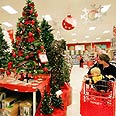
Christmas time
צילום: איי פי
Merry minority Christmas
Israeli Christians minority within a minority, but Christmas still a celebration
Christmas is the most important holiday in Christianity. Each December 25, most Christians celebrate the birth of Jesus. Christians connected to the eastern churches celebrate the holiday two weeks later.
This discrepancy is a sign of the irreparable split between the eastern and western churches.
In practice this means that when I celebrate New Year's Day on January 1, my sisters, both of whom are married to Greek Orthodox men, don’t celebrate. For them, it's just a regular day.
According to the Central Bureau of Statistics, there are 146,000 Christians in Israel, 119,000 of them Arabs. Overall, 98 percent live in urban settings. Sixty percent of those live in the north, and Christian students complete high school matriculation exams at a higher rate than any other ethnic group in the country.
Over the years, the Christian percentage of the population here has dropped from 2.7 percent in 1949 to 2.1 percent today. This drop is due to two main factors: Low natural replacement rate, and immigration to the West, mainly the United States and Australia.
Santa and the Muslims
In recent years, Christians have stopped traveling to Bethlehem, Jesus' birthplace. This has nothing to do, directly or indirectly, with the security situation in the occupied territories. There is a clear trend amongst Christians: Abandoning religion, apart from a few dozen, perhaps several hundred, people who have returned to their roots.
I'm also secular. I don’t remember the last time I went to church. But over time the holiday has become a premier social event.
The most fascinating aspect of the holiday is to see Santa Claus make his rounds. In my town, Tarshiha, there are Muslims and Christians, and Santa visits everyone. My Muslim neighbors decorate their houses with Christmas trees, and this is a good thing.
On Christmas Eve, families gather for a festive meal, and it is a good opportunity for a drink for the alcoholically inclined.
On Christmas morning, old and young alike head for mass, and everyone prepares for Christmas dinner, more than anything the symbol of this holiday: Stuffed chicken, meat, rice and more.
An Arab Catholic? Really?
I did my academic training at the University of Rome. The Italians, pleasant and with a warm Mediterranean temperament, asked about my background.
"I am an Arab, I'm a Palestinian, and I'm a Catholic," I said. But from their perspective, there is simply no such animal. "Aren't all Arabs Muslim?" they asked. You try to tell them you are as Catholic as they are.
That’s the rule with regard to immigrants from North Africa – Algeria, Tunisia, Morocco – even they have difficulty believing Arabs can also be Christians.
All my attempts to explain went for naught. Therefore, during the five years I spent in Italy, no one believed I was actually Catholic.
No escape
It's the same at home as it was in Italy. As a Palestinian Arab in Israel, as a Christian/Catholic in the Holy Land – there is no escape from being a minority.
My identity may be split, but things are very clear to me: First and foremost, I am a member of the Arab nation, then a member of the Palestinian people. Thirdly, I am a Christian.
And in this regard I would quote the founder of the Popular Front for the Liberation of Palestine, Dr. George Habash: "I am proud of my Muslim culture, I am proud of my Marxist-Leninist education, and I am proud of the fact I am Christian – and I live in complete harmony with these three elements."
Merry Christmas to all!










